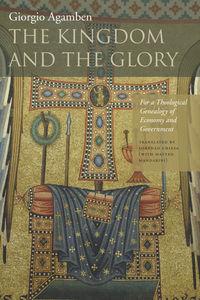
The recent publication of Agamben's The Kingdom and the Glory is a milestone in his work, completing as it does Homo Sacer, and in contemporary political theory. Unfortunately the text is long, for Agamben, and mostly made up of archival and philological observations on theology from the 2nd century on. Dotted through the text innumerable brilliant observations on our politics but I am not sure how many will get through the text to find those.
Not to worry. My forthcoming book, Agamben and Indifference, has a whole chapter that weeds out the theological detail and concentrates on its political significance. Not through some hatred of theology, just because it is the politics that most of us are interested in.
This chapter should appear as a separate article in Madrid soon. Will post link. Until then here is a taster...
To say The Kingdom and the Glory is an advance on Homo Sacer suggests something about the earlier text lags behind the later work, which is not the case, rather what I mean is that Homo Sacer was never designed to be read in isolation but a part of sequence of texts.At this point, more than a decade later, due to the full availability of the method by the time it was composed, it can be asserted without controversy that The Kingdom and the Glory (Homo Sacer II, 2) is therefore a significant and perhaps predictable corrective development of Homo Sacer I, 1 in at least three senses.The first is that it presents an articulation of Power missing from the earlier study of sovereign power, an articulation that not only suggests that Power is two-fold but that Power is not merely to be presented as articulated into two contesting elements, kingdom and government, but that said articulation defines the operativity of Power as a signature.The second is that the use of paradigms in Homo Sacer, often its most controversial moments, is superseded to some degree by the development of the theory of signatures in this later work.In that the method is made up of an interpenetration of paradigmatic logic, signatory distribution and archaeological messianic reconstruction, the lack of any mention of the signature in Homo Sacer is certainly a limitation.This is particularly the case in relation to the later work where the signatures pertaining to Power in the form of oikonomia, Secularization, Glory, Order and so on, present a much more complex and radical formation than those to be found in the paradigms of the earlier piece.The third and final difference is the development of the Agambenian method of indifference.Indistinction, one of the key synonyms for indifference in Agamben’s work, is central to Homo Sacer of course, but by the time of the publication of The Kingdom and the Glory, the centrality of indifference to the method is fully developed.By this I mean specifically the suspension of historically imposed oppositions wherein one element plays the role of the common, the other that of the proper, and thus where the common element then functions as sovereign foundation of the singularities it makes intelligible but, without which, it itself would be entirely unintelligible (the first clear definition of indifference in Agamben, to be found in The Coming Community).But I also mean that through this method of indifference, while the complete articulation of power becomes available to view through our current access to the history of its operations and the recent period of indiscernibility between its two key elements, kingdom and government already impossible to discern from Homo Sacer, the real purpose of the text is the role of inoperativity as such, specifically through the signature of Glory.In that The Kingdom and the Glory takes us, in its final pages, towards a possible suspension of inoperativity, it marks a significant advance in Agamben’s use of indifference, constituting in effect the inoperativity or indifferentiation of indifference as such.
Tags: Agamben, Homo Sacer, Political Theory, Theology, Indifference
[i] Usually I capitalise signatures b

